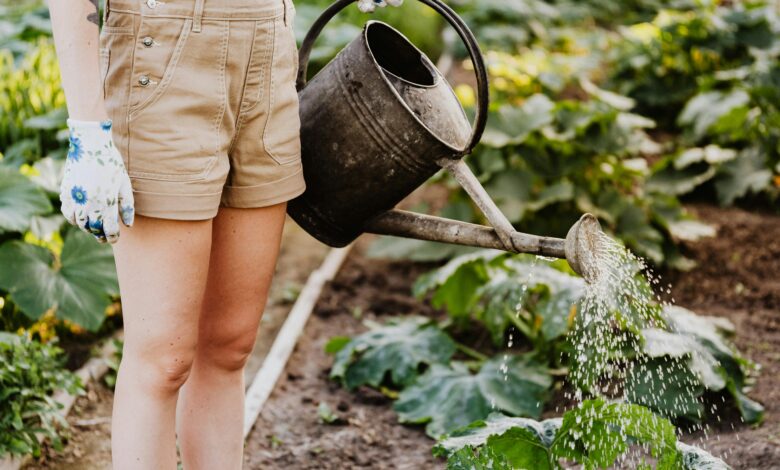Gardening for Health and Beauty: How Tending to Plants Benefits You

Gardening isn’t just about cultivating plants it’s about cultivating health and beauty in your life. Whether you’re nurturing a small balcony of potted plants or transforming a large backyard into a flourishing oasis, healthy gardening habits offer surprising benefits that extend beyond plant care. In this post, we explore how this therapeutic hobby can improve your mental and physical health, enhance the aesthetic appeal of your surroundings, and contribute to your overall well-being. So grab your gardening gloves and trowel, because you’re about to discover just how enriching the practice of gardening can be!
The Health Benefits of Gardening: Healthy Gardening Habits for Mental and Physical Wellness

The benefits of healthy gardening habits for mental health have long been acknowledged. Taking care of plants and spending time in nature can help people feel less stressed, anxious, and depressed while also encouraging quiet and relaxation. Studies have shown that spending time in a garden or even just around plants can boost mood and help improve cognitive function. The repetitive motions involved in gardening whether watering, pruning, or planting act as a form of mindfulness, helping to clear the mind and bring about a sense of peacefulness.
On the physical side, gardening provides significant benefits as well. The act of digging, planting, and maintaining your garden increases physical activity, which improves strength and stamina. Simple tasks like bending to weed or stretching to prune can also enhance flexibility. Gardening is a natural way to boost your immune system, with outdoor exposure to sunlight promoting vitamin D production, which is essential for overall health.
Gardening as Exercise: Building Strength, Flexibility, and Stamina Through Healthy Gardening Habits
While gardening is often considered a relaxing hobby, it also doubles as a form of exercise that builds strength, stamina, and flexibility. Tasks like digging holes, lifting heavy pots, and turning compost require muscle engagement and provide a full-body workout. These activities work the core, arms, legs, and back, contributing to muscle development. Additionally, gardening tasks often involve movements that require flexibility, such as bending, stretching, and twisting.
The variety of movements involved in gardening also provides cardiovascular benefits, helping to increase stamina over time. Whether you’re planting perennials, trimming hedges, or harvesting vegetables, healthy gardening habits offer an enjoyable way to stay active without the need for a gym membership.
Cultivating Beauty: Enhancing Aesthetics with Garden Design

A well-designed garden can transform any space into a beautiful, tranquil retreat. By selecting the right plants and thoughtfully arranging them, you can create a visually appealing landscape that enhances the overall aesthetics of your outdoor space. From lush flowers and vibrant shrubs to ornamental trees and calming water features, the possibilities for garden design are endless.
Consider using contrasting textures, colors, and shapes to create harmony in your garden. Pathways, sculptures, or garden lights can also serve as focal points that bring interest to your design. A beautifully designed garden does more than just look good it creates an environment of peace and beauty that can be enjoyed every day.
Harvesting Nutritional Wealth: Growing Your Own Healthy Food
One of the most rewarding aspects of gardening is the ability to grow your own healthy food. Whether you’re cultivating fruits, vegetables, or herbs, gardening allows you to have fresh, nutritious produce at your fingertips. This not only boosts your diet but also provides a deeper connection to the food you eat.
Homegrown produce tends to be richer in nutrients compared to store-bought options, as it can be harvested at peak ripeness. Additionally, by growing your own food, you have complete control over the growing process, allowing you to avoid harmful chemicals or pesticides often used in commercial farming. The act of growing your own food also enhances mental well-being, offering a sense of accomplishment and fostering mindfulness as you care for your plants.
Sustainable Living Through Gardening: The Environmental Impact
Gardening is also an excellent way to support sustainable living and minimize your environmental footprint. By growing your own food, you reduce the need for transportation, packaging, and refrigeration that contribute to the carbon emissions of store-bought produce. Gardening also promotes biodiversity by providing habitats for beneficial insects and wildlife, such as pollinators and birds.
By adopting organic gardening practices such as composting, using natural pest control, and avoiding chemical fertilizers you can contribute to soil health and reduce environmental pollution. Gardening, when done with an eco-conscious mindset, not only benefits your health but also contributes to a healthier planet.





